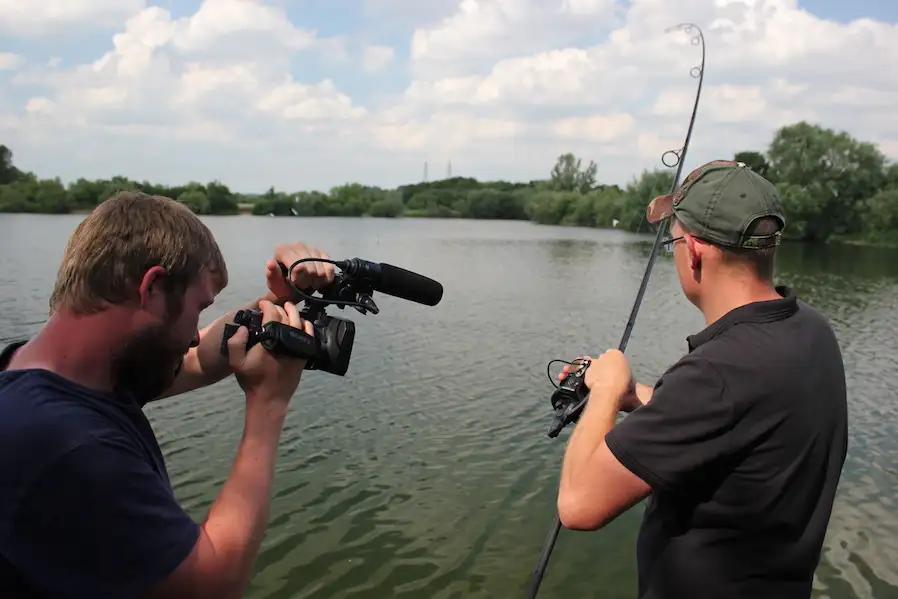This is a demo store. No orders will be fulfilled.
Ashley Ford-McAllister - Get Into Fishing

So, you remember watching Go Fishing with John Wilson. Maybe you're hooked on Robson Green's Extreme Fishing, and secretly like to imagine yourself in his place. You've heard of Angling Direct, and maybe even browsed our site. But how do you go from complete novice to King or Queen of the catch?
Well, like almost everything, the trick is to start simple. For most people, their first experience of fishing will have been during childhood beach holidays, dragging a small, simple net through rock pools, or unwinding a crab line over the side of a pier, anxiously peering down as an optimistically-sized bucket waited beside them. (And, if you were anything like me and my cousins, screaming, and dropping the crabs as soon as we saw their clacky little pincers, causing our respective fathers to sigh, and competently snare our catch, dropping it back in the sea before it came to any harm from clumsy, clueless kids.) Or perhaps you moved on from pond dipping with a jam jar, and tested a local pond or stream on summer days, putting a lot of faith in a length of dowling and piece of string.
While these pursuits aren't going to get you very far in terms of catching fish (or even crabs), they're a great way to enjoy the natural world, learn about life forms that you can't easily see, experience the challenges and rewards of being patient and quiet, and, hopefully, even in today's technology-focused world, have fun; the brilliant, and frustrating, thing about angling is there are no “fan hacks” that willl guarantee you a win!
Start Coarse Fishing
What is coarse fishing? Coarse fishing is basically going a few steps beyond those jam jar pond dips for frog spawn, and engaging with the fins-and-tail varieties of aquatic life that live in lakes, rivers, and, yes, sometimes, ponds. Coarse fishing is always catch and release – you return any fish you catch, alive, as quickly as possible.

Before you start coarse fishing, you'll need to buy a rod licence – this is a legal requirement, and you can be fined if you're caught fishing without one. On lakes and managed rivers, regular checks are made to ensure all anglers have a rod licence, although children under 12 don't need one. It is also worth noting that rivers in England and Wales, and the Esk where it borders Scotland, can't be fished during March-June (March 15th-June 16th inclusive.) This is known as the close season, and allows fish to spawn (lay their eggs) safely, so that river stocks remain healthy. You can still fish most lakes, and all rivers in Scotland and Ireland, during this period. For those new to angling, the close season provides the perfect opportunity to get to know your local river by walking along it, watching it, photographing and filming it, and coming to recognise the particular signs of the life within it, all of which will help you learn the patterns of fish activity, read to make the most of your new hobby once the rivers are open for fishing again in June – when the British weather should be starting to become more conducive to long days spent outdoors!
A good way to start coarse fishing – a good way to start anything, really – is actually not to do it at all, but to watch other people doing it. If you happen to live near a river, or have a large pond in your village, chances are, at some point, you'll see people with a rod out, watching the water. Watch them for a bit. When they get up to make themselves a cuppa (anglers do this a lot), go over, and start a conversation – most of us are happy to chat about our sport, although, as with any walk of life, you'll always encounter one or two people who only want to engage with the water.
Ask them if they've caught – don't say “Had any luck?”; while a certain amount of angling will always be down to chance, anglers work very hard, and plan in great detail, to eliminate as many unknown variables as possible. It's why a lot of anglers enthusiastically embrace technology, from fish finders to moon phase calendars – it all feeds in to a carefully constructed, strategic plan of attack. Be open about how much, or how little, you know about angling, and explain that you're thinking about getting into the sport. If an angler's not having a lot of action on their rods at that point, they'll almost always give you some good suggestions as to how to get started.
If you don't know of any water nearby, or you'd rather not bother strangers on the bank, another good option is to head to your nearest tackle shop – have a look on our Shop Finder page to see if we've got a store near you, or keep your eyes open when you're out and about; in many rural towns, the tackle shop also sells guns, and often food for fowl, livestock, and working dogs; it may look a bit dull and dusty, but don't judge – there'll often be gems of information to be had inside. Tackle shop staff, and certainly those at Angling Direct, can usually point you in the direction of a local venue that holds open days (if you're in, or near, Oxford, definitely try and check out Linear Fisheries' Open Day on May 12th – they're one of the biggest and best in the business, and a great way to see exactly what angling as a whole has to offer, including coarse and carp fishing, right through to predator fishing.) Going along to a venue's open day is a good way to meet other anglers, and perhaps get to know more experienced folks who live near you, and would be happy to become your angling mentors as you learn the ropes, or lines, of a new sport. Or why not see if the Angling Trust has any experience days at a water near you? (There's still – just – time to head to one of their March “Spring Into Fishing” events over the Easter weekend – a great way to learn a new skill, and get into a new hobby, durring this season of celebrating new life.)
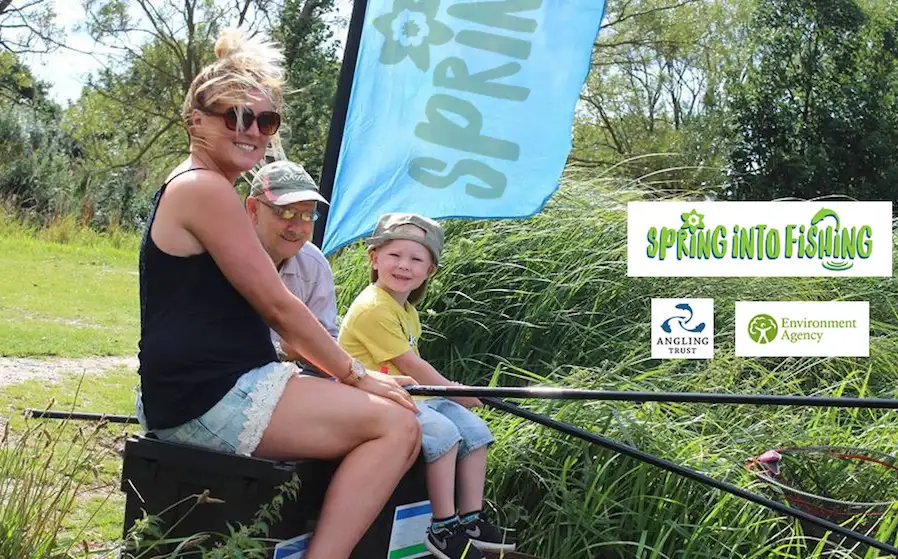
While the sheer amount of coarse fishing tackle available can be overwhelming, when you first head out to wet a line, you can get by with the basics; a rod that's strong enough to handle a lively fish, if you catch (you probably won't be in the realms of the huge carp for a while yet – tiddlers teach you how to handle the truly huge specimens, so enjoy them, and respect them – one day, after a battle royal with your new personal best, you'll look back at the sliver of silver that marked your first catch, and sigh at how effortless angling used to be, the stress of getting that little 1lb dart of life onto the bank for the first time entirely forgotten), a reel that allows you to get your line out quickly, and play a fish in steadily and safely – a fixed spool reel, pre-loaded with line, is good to start with; a money-saving choice, that still gives you the power and resilience you need, is to buy a rod and reel combo, such as the Leeda Coarse Outfit – some bait, both to scatter in the water, and to attach to your hook; Advanta has a wide range of bait options, and, if you pop in to your local store, our friendly staff can advise you on the best flavours and styles for the fish you're likely to catch on the venue you're heading to, hooks, a plastic disgorger, a landing net, and an unhooking mat. If you don't have a suitable sports holdall to carry it all in, have a look at the Luggage range on our website; there's plenty of stylish options that, if you do decide angling's not for you, would look equally good on a hiking trail, or in a paintballing match. While it's unlikely that you'll be catching fish you want to know the weight of early on, investing in a set of bankside scales and a weigh sling will set you up for your fishing future. Having a pair of sturdy scissors with you is also a good idea – even experienced anglers have to deal with the frustration of line tangles from time to time, although there are ways to limit the chances of them happening, and, sometimes, there's nothing for it but to cut the line completely. Cutting your line close to the hook can also make it easier to safely unhook a fish, so always pack your scissors first.
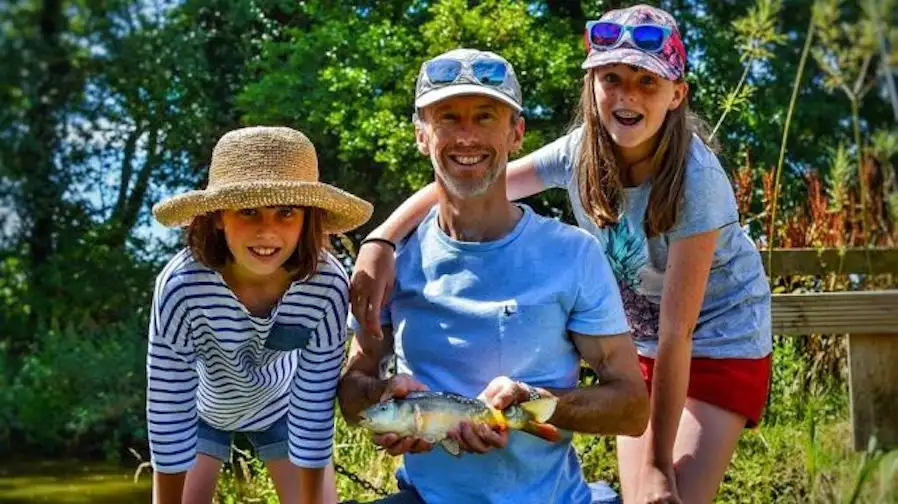
This tackle kit is very, very basic, and you'll be adding plenty to it over time, but, for your first session, it's adequate. Ask staff at your local tackle shop about ready-made rigs, and how to use them, as they'll increase your chances of getting that beautiful, thrilling first bite; in time, you may well start wanting to experiment with tying your own, and we've got some handy videos on our YouTube channel that talk you through a few simple rig set ups.
Clothing
You don't need any special clothing to start coarse fishing, just something hard wearing and warm that you don't mind getting wet and dirty, as a very basic start. However, moisture-wicking jogging bottoms, and a waterproof jacket that keeps you warm without causing you to sweat, will make your fishing that bit more comfortable, and, therefore, more enjoyable. Good quality socks are a must, and a strong, sturdy pair of boots is always better than trainers. In the early days, this should serve you for most of your fishing. If you want to invest in quality fishing clothing from the very beginning of your angling adventure, then a pair of waders is a good place to start, as these will keep mud and bankside dirt off your jeans or trousers, and will give you the flexibility of stepping into the water if you feel that it would be easier to unhook a fish in the shallows, rather than bringing it onto the bank – a sensible decision if you're at all unsure about bringing a hooked fish out of the water.

Polarised sunglasses are helpful, too, as they eliminate the glare that light causes on the surface of the water, making it easier to see where fish are. In time, and with patience, you'll learn to recognise the unmistakable “showings” of fish – this is a skill you can hone simply by walking, watching, and making notes, coupled with reading angling books and blogs that are aimed at the beginner. Seeing a fish, or a shoal, “show” themselves, usually to catch insects that have landed on the surface of the water, is a magical experience, and one that fish finders can never replace. For many anglers, a good showing can create a warm glow of satisfaction that lasts even through a day of complete blanks – the technical term for “not catching a flippin' thing!”
Coarse Catch Up;
- Start simple, and start by talking to people
- Go to open days at local venues
- Head to your local tackle shop
- Enjoy the experience, even if you don't catch (you probably won't.)
- Read books and blogs, watch DVDs and TV programmes, spend non-fishing time in the environment you'll be fishing.
- Look after any fish you do catch while they're on the bank with you, and put them back alive and healthy; make sure they swim off strongly. These are fish to be admired, not acquired
Start Sea Fishing
There can be few better things to do during a British seaside beach holiday in the summer months than to find a charter boat that's running fishing trips, and spend a day out on the ocean. Usually, boats will include all the bait and tackle you need, and will usually have several other people who've never dropped a line into the water before onboard, too, so you'll be in good company, and supported by experienced, competent crew who will be using their local knowledge and fishing skill to ensure everyone on board catches something, and everyone has a good time.
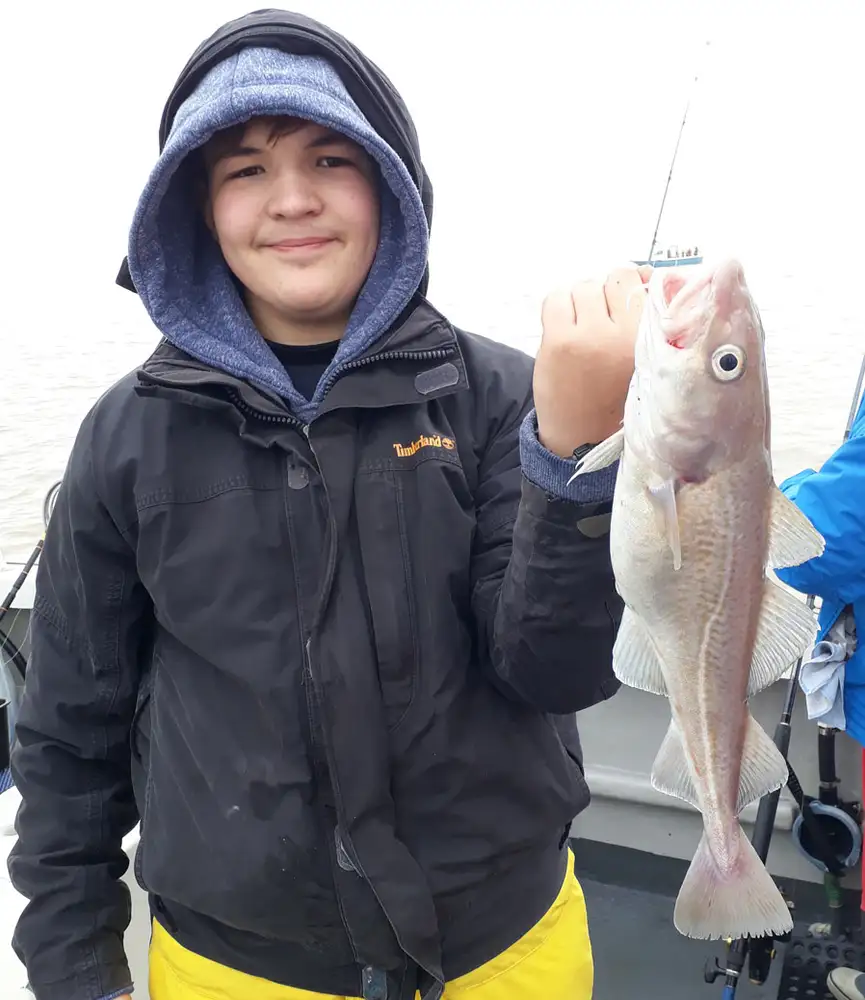
Heading out on a fishing charter is a grown-up version of standing at the pier rail with your bucket and crab line, and even more exciting. Just like those childhood days, when your dad calmly picked up the scuttling crustacean that had set you screaming, charter trips give you the reassurance of experienced sea anglers, who will help you land and unhook your catch quickly and safely.
Unlike coarse fishing, there's no close season for sea fishing; however, unless you live on the Cornish coast, where the sea temperature is significantly warmer than the rest of the UK year-round, you won't catch much between March, when the winter species start to head for far cooler waters, and late May/June, when the waters in most of the UK start to warm up enough for summer species, such as mackerel, to head our way.
When most people think of sea fishing, they imagine mackerel on a beach barbecue (and freshly caught mackerel, with the tang of the surf still on them, are absolutely delicious grilled), or of catching a large, gleaming cod that will provide a decent dinner for everyone. And, yes, you can eat what you catch when you take your angling out to sea – within limits. You can only keep fish over a certain length (which will vary depending on the species, and, sometimes, the season), as smaller fish are usually youngsters, and needed to maintain a viable breeding population. Bass, which provide fantastic sport, with a lot of fight, are entirely catch and release for recreational anglers at the moment, as their stocks have been judged to be lower than is sustainable. (Commercial trawlers can still bring in bass... but that particular conflict is a discussion for another blog!) If you're on a charter boat, it will be made clear whether you can keep a particular fish, or if it needs to be returned.
With charter fishing trips costing between £30 and £50 for a full day in most places, this is a fun way to experience the unique challenges of sea fishing without the expense of investing in your own tackle, and with plenty of friendly support and guidance immediately at hand. Make sure you wrap up warm – even on a bright summer's day, it will be very cold out on the open ocean, owing to the wind chill factor. A waterproof coat is a must, and you should always wear the life vests any charter boat is legally required to provide you with.
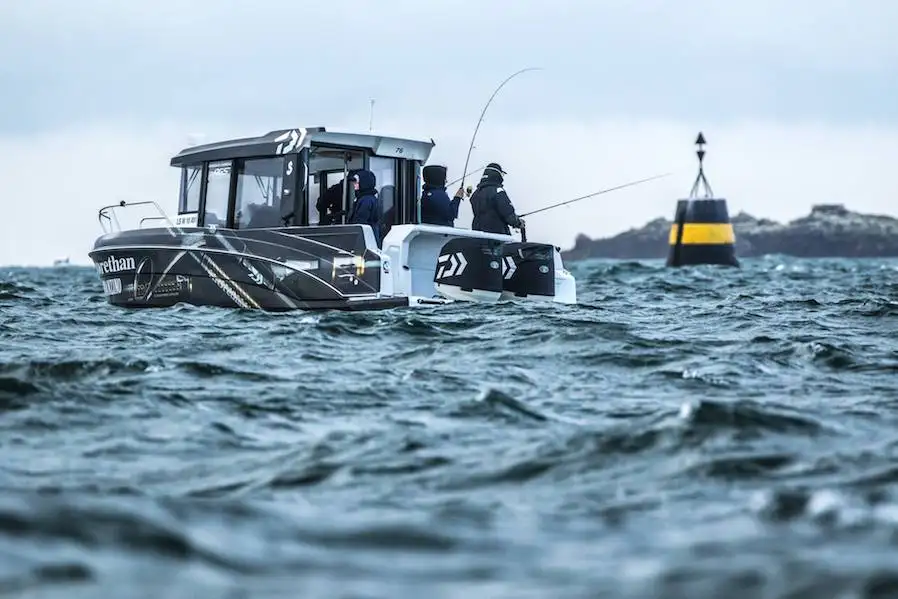
If you do decide to explore sea fishing on your own account, as a shore-based angler, then buying tackle that's specifically designed for sea fishing is a must. Not only are rods built to be stronger and more durable, in order to cope with strong tides and the increased likelihood of snags,but saltwater tackle is designed to resist the corrosive impact of sea water's high salt content, which means your reel will last beyond the first time you take it out. Because tides, and the fish that live in the waters that create them, can be incredibly strong, there's every chance your rod and reel might end up in the waves at some point during your fishing session, especially when you're first starting out. A tripod rod rest, such as the Shakespeare Beach Rest, is a sensible buy for shore fishing, allowing you to set your rod up securely, and leave it, keeping your hands free while you wait for some action, and allowing you to enjoy that vital component of sea fishing – a hot drink!
Sea Fishing Summary;
- Charter trips are a great introduction to the discipline
- Buy tackle that is specifically designed for saltwater use
- You can eat larger fish that you catch (Google for size limits on common species), but ALL bass MUST be returned alive and healthy if caught on rod and line
- Wrap up warm, and remember your thermos!
Fishing Beyond The Basics
Fly fishing, predator fishing, and match fishing are all great ways to experience more of the wealth of possibilities that angling has to offer, but, as they are a lot more technical, it is best to book a session with a professional, experienced coach in order to get the most out of any toe-dips into these areas; this is particularly true of predator fishing, as species such as pike are a lot more fragile than they look, and handling them safely takes skill that you can only really learn under careful guidance from an angler who's done it many times before.
If you're curious about match, predator, or fly fishing, pop in to your local Angling Direct store, and ask about local tuition, and subscribe to our YouTube channel, ADTV – we often have tips, tricks, and introductions from our talented team of experienced, passionate anglers, along with many other videos we're sure you'll enjoy watching, and which will give you plenty of background to the potential of angling as a sport. Watching fishing videos online, and reading anglers' blogs, is a great, free, way to get a feel for the sport as a whole, and the particular element of it you think you'd like to pursue, before deciding to dive in, and spend money getting the tackle, clothing, and other accessories. If you decide you don't want to head out and get wet, you'll still have the benefit of knowing a little more about the world around you than you did before, which will lead to a deeper sense of appreciation next time you're walking along your local river path, or gazing out to sea.
